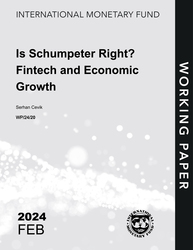
Is Schumpeter Right? Fintech and Economic Growth
Is Schumpeter Right? Fintech and Economic Growth
READ MORE...
Volume/Issue:
Volume 2024
Issue 020
Publication date: February 2024
ISBN: 9798400266324
$20.00
Add to Cart by clicking price of the language and format you'd like to purchase
Available Languages and Formats
| English |
Prices in red indicate formats that are not yet available but are forthcoming.
Topics covered in this book
This title contains information about the following subjects.
Click on a subject if you would like to see other titles with the same subjects.
Finance , Investments and Securities-General , Economics- Macroeconomics , Economics / General , impact magnitude , capital raising , novel dataset , statistical significance , fixed capital capital formation , Fintech , Digital financial services , Gross fixed investment , Financial sector development , Global
Summary
The rise of fintech is revolutionizing the financial landscape, with products and companies advancing innovative technologies to improve and automate financial services. In this paper, I use a novel dataset and implement a dynamic modelling to investigate the relationship between fintech and economic growth in a panel of 198 countries over the period 2012–2020. This cross-country approach—utilizing direct measures of fintech and dealing with potential endogeneity—provides interesting empirical insights. First, the impact magnitude and statistical significance of fintech on real GDP per capita growth depend on the type of instrument (digital lending vs. digital capital raising). While digital lending has a statistically significant positive effect on economic growth, digital capital raising has a large but insignificant effect. Second, the overall impact of fintech including all instruments is positive and statistically significant because of the overwhelming share of digital lending in total. Finally, while the positive relationship between fintech and growth is stronger in magnitude in advanced economies, the statistical significance of this effect is higher in developing countries. Taken as a whole, these results confirm Schumpeter’s prediction that financial innovation can promote growth, but not every type of fintech becomes an accelerator.
Copyright © 2010 - 2026
Powered by:
AIDC



